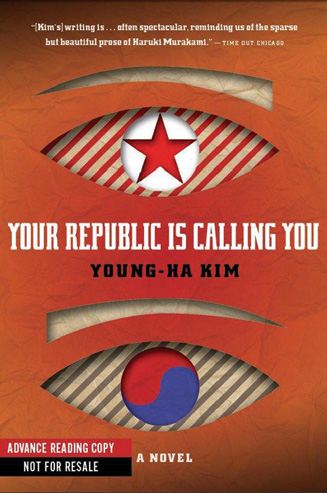
How Chi-Young Kim brings Korean novels to life for English-speaking readers.
by Jae Won Chung
illustration by Ann Lee
CHI-YOUNG KIM is an award-winning translator who, to date, has made it possible for English-speaking audiences to read five Korean novels, including the South Korean bestseller Please Look After Mom by Kyung-sook Shin. It seems almost fitting she would etch out a career serving an in-between role, as the Boston native spent her childhood moving between Korea and North America every three to five years.
She studied French and history at Wesleyan University, and worked at Archipelago Books, a New York-based publishing company. It was then that she started translating on the side, a logical avocation since her mother is also a translator. Kim conducted this email interview shortly after the publication of the English version of Please Look After Mom in the U.S. earlier this year.
[ad#336]
Jae Won Chung: You’ve translated a fair number of important Korean books into English now. Were there meaningful differences in the kinds of challenges they posed for you as a translator?
Chi-Young Kim: For Please Look After Mom, the fact that the Korean original doesn’t always name the characters threw me for a loop. As you know, in Korean it’s easy to figure out who’s speaking, what the relationship is between the people speaking, or what the mood or tone of voice is, even without much description. I had to be very conscious of how someone with no knowledge of Korean would understand the dialogue, as well as the underlying sentiments and unspoken feelings.
Also, the editor I worked closely with was confused by the fact that none of the cities were named, and that several universities were just referred to as Y University. All Koreans know what university that is [Yonsei University], but we ended up being very specific about those types of names after consulting with the author. I had the most interactive experience doing Please Look After Mom.
The editor would ask questions and make suggestions, and I would answer what I could and ask the author to clarify, or if she could add more or delete, depending on the editor’s suggestion. Then, the author would weigh in with her ideas and preferences, which I then conveyed to the editor. So it was truly a collaborative project.
JWC: I happen to be reading Three Generations (1931) by Yom Sang-seop. The book is translated, of course, by Yu Young-nan, who happens to be your mother. I am curious about what it was like for you to grow up as a daughter of an established translator.
[ad#336]
CYK: She was always reading throughout my childhood, both to me and my sister and by herself, and reading was very important in our family. We went to the library all the time, checking out something like 15 to 20 books at a time—whatever the maximum was—and going back the next week to get new ones. Since we moved around a lot, reading was one way to keep up with my Korean and English. … I also read certain books both in Korean and English. When I was very young, I read Anne of Green Gables in Korean, and when I was older, I reread it in English;
I did the same with Les Miserables. I only realized when I was much older, when I read Les Mis in English, that the main character’s name was Jean Valjean. Since it was 장발장 in Korean, I’d thought his name was Long-Haired Jean! When I got older, [my mom and I] would sometimes talk about what she was translating, how she was handling certain passages, and I started to read her translations when I was in junior high and high school. So it never was a conscious decision to translate. Honestly, when I was living in New York, working in publishing for pennies, I just decided to do it on the side to make a few extra bucks. Then I realized how much I enjoyed doing it, and the rest is history.
Now, we often talk about what we’re translating and pick each other’s brains about word choice, or flow or whatever. It’s invaluable because she has decades of experience and really good ideas on how to solve sticky issues that come up. Since my Korean isn’t as good as my English, and I’m not very good at reading Chinese characters, it’s very helpful to have her help when there is Chinese in the text, or if I am unsure of what a specific word should be translated as. Oh, and since I haven’t lived in Korea as an adult, there are so many things that I just don’t know about. Like, I didn’t know that 처음처럼 (literal translation: “like the first time”) was the name of a soju, so I kept translating it in a weird way, until my mom sent me a picture of the soju bottle.
JWC: Can you elaborate on any recurring differences in sensibility (정서) that you find difficult to get across when you translate?
CYK: One is repetition. Korean novels can meander and repeat words or phrases or parts of scenes, but that doesn’t translate well into English. It tends to read like a mistake. And to find the right balance between the author’s voice and English literary conventions is fairly difficult. Another is the fluidity of tenses.
For Please Look After Mom, there was a lot of confusion among English-speaking readers about the chronology of events, especially when a character, in the middle of a present scene, reminisces about past events and from there, refers to past events that are closer to the present, or even further in the past. The editor, the author and I played with page breaks and making new paragraphs and moving paragraphs around before we settled on the final version. As for dialects or honorifics, I usually don’t even try to translate those, unless the original mentions it specifically, and even then, I just translate the dialogue in straight English. Like, “So and so started using the informal form of speech,” or something. I’ve read some translations where [a certain accent] is made into an American southern dialect, and that feels jarring and out of place.
[ad#336]
JWC: Tell us more about your relationship with translation in general. For one, you’ve been frighteningly productive, publishing five book-length translations in the span of four years.
CYK: I have always been translating on the side, from when I was an editor at Archipelago Books in New York, through law school, as a practicing attorney, and now as I work at a museum. My first love was literature, so it’s kind of a nice way to be able to do what I love, while not having to worry about my next paycheck. Also, I appreciate how my diverse jobs have, in many ways, informed my translating life. Since I don’t have all the time in the world to complete translations, I am forced to be very choosy about what projects I take on, and to be extremely efficient at it.
One thing I have always noticed is the fact that a translator can’t really scrub away where he or she is from; some translators are clearly British, while others are obviously American. I know that my style tends to be very American and young, which I consciously try to be less obvious about, especially when the Korean original doesn’t fit that tone.
JWC: Can you talk about specific instances of slang or idiomatic expressions that you might have struggled with?
CYK: I was just working on something recently, where a prostitute says to her customer, “자기 멋져.” I kept coming back to that because, not only do you have to convey the meaning behind it, you also have to make it sound authentic. I don’t think a woman in that situation would say, “Honey, you’re great.” I thought about how prostitutes spoke to each other in books and movies. In the past year, I’d read Colum McCann’s Let the Great World Spin, which has several prostitutes as the main characters. I thought about how he had described that world, and how those characters spoke, and settled on “Baby, you’re awesome,” for now. It still doesn’t feel 100 percent right to me, so I’ll probably revisit it later.
JWC: Translators are often reprimanded for all that might be lost in translation. People don’t talk enough about what might be gained. I would be interested to hear what your thoughts are on Shin Kyung-sook’s book being released in the U.S. How do you see the text as having evolved through the process of translation?
CYK: The English version of Please Look After Mom is somewhat different from the Korean original. For the American audience, the editor thought it would be confusing that Chi-hon never refers to her boyfriend by name, so we asked Ms. Shin about that, and she provided us with the boyfriend’s name. There is [also] a scene where Mom says, “I don’t want to be buried under you, Aunt,” which makes sense when you know what Korean graves look like, but not if you’re picturing a Western-style cemetery. So we added a sentence, describing briefly how Korean graves are on a slope, and the different graves are situated on the slope depending on your age, etc.
Another example is:
“- 박소녀. 그때 당신이 웃었네. 왜 그런 마음이 들었는지 모르겠소. 나는 당 신을 한번 더 웃게 해주고 싶었네. 그래, 당신이 묻지도 않았는데 언니 이름은 대 녀라고 알려주었네. 당신은 한번 더 웃었 소. 그러더니 자신의 이름은 은규, 형 이 름은 금규라고 했소. 부친이 이름을 지을 때 제발 돈 많이 벌어서 부자로 살라는 뜻을 담은 이름이라고. 당신 형제들을 부 를 때 금궤야, 은궤야, 라고 불렀다고. 그 덕분인지 금궤인 형이 은궤인 자신보다 쬐금 더 잘산다고.”
“Park So-nyo. You laughed then. I don’t know why I did what I did next, just that I wanted to get you to laugh one more time. Even though you didn’t ask, I told you that my older sister’s name was Tae-nyo, which means ‘big girl.’ Our names–Little Girl and Big Girl. You laughed again. Then you said that your name was Eun-gyu and your elder brother was Kum-gyu. That your father gave you names containing the words ‘silver’ and ‘gold,’ with the hope that you would earn money and live well. That he called you Silver Coffer and your brother Gold Coffer. That, perhaps because of that, your brother, Gold Coffer, lived a tiny bit better than you, Silver Coffer.”
Unfortunately, I wasn’t able to get the play on “은규” [and] “은궤” (Eungyu and “silver coffer” sound almost identical in Korean.), but that is one thing that was impossible to convey without adding something like a footnote, which I don’t believe belongs in a novel. Since this novel is being well received in the States, and because it deals with universal themes and is very accessible, I think it has the potential to introduce Korea and Korean culture to a wider audience, to people who might never have known anything about Korea.
This interview is an excerpt. To read the exchange in its entirety, please visit www.subjectobjectverb.com.
This article appeared in the August 2011 issue of KoreAm. Subscribe here!












